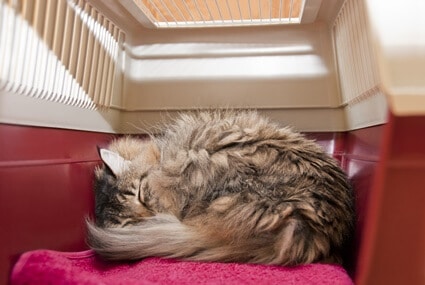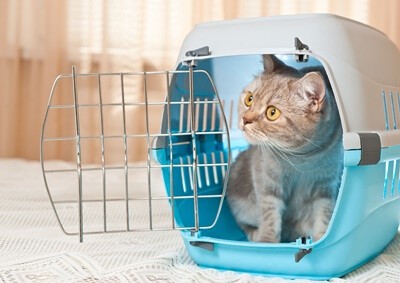Cats are free-roaming animals that rarely cope well with being trapped. Anyone who has transported a cat to the vet in a carrier will be aware of this fact, making caging and crating cats controversial.
The benefits of keeping a cat caged at night are that you won’t be woken up, it makes litter training easier, and it can enhance your cat’s safety level if it has an injury or has undergone surgery. However, you’ll need to train a cat to accept nocturnal caging, and if it shows considerable distress when caged, it should be released.
Some cats welcome the opportunity to sleep in a crate, and such a location will provide safety, peace, and quiet. Just ensure that you release your cat ASAP, as felines don’t cope well with prolonged confinement.
Can Cats Be Caged?
Caging cats is a necessity for some owners, and for others, it flies in the face of a cat’s nature.
As curious and territorial animals, cats relish the freedom to roam free. Before we go any further, we should discuss the unwritten ground rules of caging cats. There are only two to focus on:
- Never cage cats as a punishment for unwanted behavior. Crates are not kitty jail cells.
- Cats cannot be caged for many hours at a time. The crating must be sparing and justifiable.
Some common reasons for crating include:
- Safety – The cat may need to be caged for its own protection.
- Temporary confinement – Cats are masters at hiding, so you may wish to cage your cat ahead of a vet appointment.
- Adjustment – If you’ve recently moved house, or adopted a second pet, your cat may feel more comfortable in a cage that it has claimed as territory.
- Recovery – If your cat is recovering from an illness or surgery, the solitary quarantine of a cage may be beneficial.
- Sleep – Caging a cat may be the only way to get a good night’s sleep.
So, is it cruel to cage a cat? This depends on the nature of the cat in question. Some cats are content to stay in a cage, especially overnight. However, others will react poorly, so the most important thing to keep any cage time short.
If your cat won’t stop meowing in a cage, it’s unhappy, so find an alternative solution. If the cat seems content enough and no negative behaviors manifest, it may relish short-term confinement.
How Long Can a Cat Stay in a Crate?
There is no hard-and-fast rule about how long cats can remain in a cage or crate, but you should release your cat from confinement as early as possible. Cats have an instinct to wander and roam free.
If you’re caging your cat for logistical purposes, keep the confinement brief. Complete the activity that necessitated the caging and release your cat.
If you’re caging a cat overnight, only lock it away at bedtime and open the door the moment you wake up.
Is It Okay To Cage A Cat At Night?
Many cats sleep in cages during the nighttime as a protective measure for young or elderly felines.
Let’s explore reasons for caging cats overnight and whether they’re acceptable:
Minimizing Sleep Disturbance
Cats love to patrol the home after dark. They have superior night vision, and while owners are fast asleep, nobody can prevent them from doing what they desire.
Unfortunately, cats aren’t renowned for their respect for human sleep. While they move with the utmost stealth when hunting, cats’ footsteps sound like a herd of elephants at night. This may keep owners awake or upset neighbors, especially in an apartment block.
Cats also have no qualms about waking owners. If your cat grows hungry or playful overnight, it’ll likely demand attention. Anthrozoös has stated that this can be disruptive, especially if it becomes habitual.
In theory, caging a cat eradicates the risk of disturbed sleep, but the reality isn’t always that simple. If a cat is unhappy with being caged, it will meow and yowl through the night.
Litter Box Training
Another common reason for caging cats overnight is litter training. Kittens have immature brains, bladders, and bowels. Left to roam free at night, they may eliminate in undesirable locations. If such a spot becomes a designated toilet, the cat may resist retraining.
Senior cats also struggle with their bodily functions. Incontinence becomes increasingly commonplace in older felines, especially those with cognitive decline. Cats of any age can experience ill health, such as urinary tract infections.
A large cage overnight will keep cats close to a litter tray. Your cat will have easier access to an acceptable toilet that reduces the risk of emergency cleaning in the morning.
Unfortunately, this can be stressful for your cat. Cats are fastidiously clean and dislike being near their waste, so your cat may grow stressed and anxious if it’s forced to sleep beside a litter tray.

Protecting The Cat From Harm
Believe it or not, caging a cat can be for its own good. Cats, especially kittens, can get into trouble at night when unsupervised, and caging prevents this from happening.
Caging also offers protection if your cat is prone to leaving the house at night. If you’re keen to keep your cat home, consider caging as this will prevent them from encountering wild animals or hazardous road traffic.
Caging can also be a great way to introduce a new pet to a resident cat. It often takes time for two or more cats to bond. Aggression over territory or resources is inevitable at first, and caging stops them from crossing paths after dark when fighting cannot be broken up.
Bonding Mothers And Kittens
Kittens will invariably take their cues from their mother, learning about appropriate behaviors from this parent. Keeping kittens and queens together in a cage means that they won’t be separated.
This will typically be fine with the mother cat. Giving birth is exhausting, and queens like to remain close to their kittens. Encouraging all cats to sleep together is considerably easier.
This doesn’t mean that you can cage the animals together all day. As always, mothers and babies alike will need exercise and the opportunity to express their instincts throughout the day.
When night falls, bedtime is bonding time for your feline family.
Can Kittens Sleep in a Cage at Night?
Kittens are best positioned to sleep in a crate at night. If a kitten has never known otherwise, it’ll consider a cage its bed. This can be invaluable early training if you want to cage a cat overnight into adulthood.
When kittens need to eliminate, they cannot hold it for long, so immediate access to a litter tray will speed up training.
Caging keeps kittens safe and cozy. The curious nature of young cats is fun but potentially dangerous when unsupervised. If you crate kittens at night, they cannot get into trouble.
Consider just how much time the average kitten spends sleeping. Some young cats can spend up to 90% of a day dozing, so a cage provides a quiet and sheltered place to do so.
Creating the Ideal Night Cage for Cats
To stand a chance of successfully caging your cat, you’ll need to create a welcoming environment. If you wish to crate your cat overnight, get a cage designed for large dogs.
A wire cage will mean that your cat can still see what is happening around it. Of course, this could backfire as your cat may want to interact with its surroundings.
You’ll need to ensure your cat has everything it needs in the crate. Start with a familiar, favored bed or cushion. Your cat is likelier to enter the crate if it hosts a comforting scent. Toys will also provide entertainment.
Make sure your cat has access to a litter tray. If the crate is big enough, include some dry food. This requires a particularly large crate as cats loathe eating too close to where they eliminate.
Training a Cat to Sleep in a Cage
If you want your cat to sleep in a crate, do not just lock it inside and hope for the best. This will cause distress, and the cat will wonder why it is not permitted to roam, especially if it usually does so.
Like most matters of feline training, you’ll need time and patience to make this feel like a welcome accommodation.
Follow these steps to help your cat feel comfortable sleeping in a crate:
- Place the crate in familiar territory with the door open, allowing the cat to investigate it independently.
- Praise your cat when it enters the crate, potentially offering a treat.
- When your cat starts to enter the crate willingly, close the door for one minute.
- Gradually increase the time you spend with the door closed.
- Spray a little Feliway in the crate.
Eventually, you can experiment with walking away and leaving the cat caged overnight. Stay within earshot of your cat so you can hear verbal signs of distress, but avoid staying so close the cat can smell you.
Can I Use a Cat Carrier as an Overnight Cage?
Crates or cages that are used overnight must be spacious. This eradicates the possibility of using a carrier, such as the one you’d use to transport a cat to the vet.
Cat carriers are small and cramped. While they’re convenient for getting your pet from A to B, they’re not designed for long-term stay. In addition to the psychological stress your cat will experience, a carrier is too small for food, water, and a litter box.
So, if you’re wondering, “can I leave my cat in a carrier overnight?” the answer is no. The only exception is if your cat is recovering from major surgery and should not be permitted to move.
Alternatives To Caging A Cat At Night
As established, caging a cat at night is an answer to nocturnal issues but not the best solution. If your cat enjoys such temporary confinement, you can confidently cage it.
Alas, not all cats adapt to overnight caging. There are alternatives to this approach if your cat cries and verbalizes throughout the night.
If your cat rejects confinement, these options are worthy of investigation:
Assigning a Bedroom
One of the concerns about caging cats is the restriction of movement. If you have a spare room, confining a cat to a single space is preferable to locking it in a cage.
This doesn’t need to be a bedroom, as anywhere your cat has claimed as territory is OK. This could be a utility room or even a lounge if you have a door you can close.
Ensure that the room has easy access to dry food, litter boxes, water, beds, and toys. This shouldn’t be unfamiliar terrain. Choose a room that your cat already gravitates toward so that it remains comfortable.
Keeping a cat in a single room may not eradicate all noise complaints, but it’ll prevent your cat from physically interacting with you while you sleep. A closed door can also keep a cat out of trouble in the rest of the house.

Sleep Training
Felines are naturally crepuscular, meaning they are most active at dawn and dusk.
This is why you may find your cat staring at you, looking wide awake, first thing in the morning. Unfortunately, this means cats have slightly different circadian rhythms from humans.
Left to their own devices, cats will keep their own hours. You can train a cat into sleeping through the night, and this negates the need to keep your cat in a cage. If your cat sleeps when you do, it won’t cause any disturbance.
The best way to sleep train a cat is around food and play. Cats nap and doze throughout the day but enjoy a deep sleep after eating. If you feed a cat too early, it’ll sleep before you retire for the night and wake up long before you.
To eradicate this, hold off feeding your cat until around two hours before you go to bed. Play with your cat first, so it works up an appetite. Follow this by feeding your cat its main meal of the day.
Your cat will groom itself and fall into a deep sleep. While the world is quiet, the cat is unlikely to be woken up, and there’s every chance it’ll remain fast asleep until you rise in the morning.
Spaying or Neutering
If your cat has not been spayed or neutered, consider this as an alternative to caging.
While fixing your cat will not be a miracle cure for any ailment, it can reduce unwanted behaviors. This includes prowling and crying at night, as well as inappropriate elimination.
If a cat has been spayed or neutered, it’ll be calmer. Females in season are noisy at night, attempting to attract a mate. Equally, an intact tom will be constantly keen to escape the home and find an eligible female.
CAB Reviews confirm that spaying females offer more benefits than risks. The chances of developing mammary cancer in later life are drastically reduced. Also, calmer behavior after dark is a welcome benefit.
Caging a cat overnight is a matter of personal preference for the owner and feline alike. If you wish to keep your cat caged at night, train the behavior as early as possible and be consistent. If your cat rejects caging, seek an alternative solution as unwanted confinement will cause unnecessary stress.

